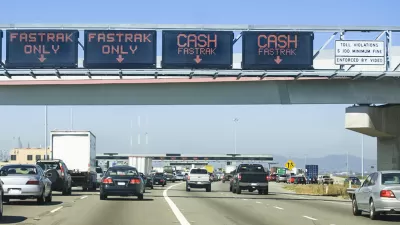It's time to fund federal transportation like most other nations do—rely less on highway user fees that dedicate funds to highways and transition to funding roads from the general fund, perhaps in the same amount that they contribute to GDP.
Joshua L. Schank, president and chief executive of the Eno Center for Transportation, makes a convincing case in this New York Times op-ed for essentially ditching the Highway Trust Fund - a protected, dedicated source of funding that was born with the interstate highway system, and relying more on dedicated general funds that he believes will be "somewhat insulated from the political forces that surround transportation funding, and more focused on getting the federal government the maximum return on its investments."
No other developed nation relies so heavily on user fees like the gas tax. While other countries typically have much higher gas taxes, they do not dedicate these revenues to transportation. Instead, they use general revenues.
So should America. One option is to dedicate part of the income tax revenue that corresponds to transportation’s contribution to gross domestic product, or about 10 percent (around $160 billion). Dedicating even half of that to transportation would cover America’s needs and effectively align transportation with economic growth.
After all, that's exactly what this country has been doing since 2008. "We have infused the trust fund with over $55 billion in general fund revenues (not including stimulus funding), and proposals from the president and the House of Representatives have called for $150 billion and $125 billion more, respectively, both funded through corporate tax reform," he writes.
The problem with these actions and proposals is that they are one-time, short-term fixes, while transportation projects take years to complete. Effective modern transportation is less about building more highways, and more about operating our existing systems more effectively while harnessing the benefits of technology.
Eno's suggestion goes against the user-fee principle that has been the basis of federal and state transportation funding for almost a century, beginning with Oregon's 1919 gas tax. [The federal government was a little late to the game, initiating its per-gallon tax in 1932.] It adds a new dimension to transportation funding policy that leaders should take seriously, particularly those who oppose raising taxes.
FULL STORY: America’s Highways, Running on Empty

Alabama: Trump Terminates Settlements for Black Communities Harmed By Raw Sewage
Trump deemed the landmark civil rights agreement “illegal DEI and environmental justice policy.”

Study: Maui’s Plan to Convert Vacation Rentals to Long-Term Housing Could Cause Nearly $1 Billion Economic Loss
The plan would reduce visitor accommodation by 25% resulting in 1,900 jobs lost.

Planetizen Federal Action Tracker
A weekly monitor of how Trump’s orders and actions are impacting planners and planning in America.

Wind Energy on the Rise Despite Federal Policy Reversal
The Trump administration is revoking federal support for renewable energy, but demand for new projects continues unabated.

Passengers Flock to Caltrain After Electrification
The new electric trains are running faster and more reliably, leading to strong ridership growth on the Bay Area rail system.

Texas Churches Rally Behind ‘Yes in God’s Back Yard’ Legislation
Religious leaders want the state to reduce zoning regulations to streamline leasing church-owned land to housing developers.
Urban Design for Planners 1: Software Tools
This six-course series explores essential urban design concepts using open source software and equips planners with the tools they need to participate fully in the urban design process.
Planning for Universal Design
Learn the tools for implementing Universal Design in planning regulations.
Caltrans
Smith Gee Studio
Institute for Housing and Urban Development Studies (IHS)
City of Grandview
Harvard GSD Executive Education
Toledo-Lucas County Plan Commissions
Salt Lake City
NYU Wagner Graduate School of Public Service



























